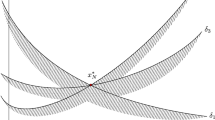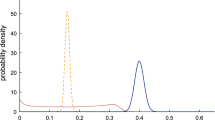Abstract
Scenario analysis, originally proposed by Rockafellar and Wets, is a widely applicable method for introducing uncertainty into practical decision problems. As it often leads to very large optimization problems, one needs special techniques for the resulting numerical computation. One such technique, the Progressive Hedging Algorithm, is simple and universally applicable, but it can be slow. In this paper we show how the bundle decomposition method can be applied to linear or convex scenario analysis problems that are loosely coupled. We illustrate its effectiveness by presenting computational results for military force planning problems and for multi-scenario network models of production planning.
Similar content being viewed by others
References
B.J. Chun, Scenario analysis modeling & decomposition methods, Technical Report 92-8, Department of Industrial Engineering, University of Wisconsin-Madison, Madison, WI (1992).
B.J. Chun, Scenario analysis modeling and decomposition methods for optimization under uncertainty, Ph.D. Dissertation, Department of Industrial Engineering, University of Wisconsin-Madison, Madison, WI (1992).
B.J. Chun, S.J. Lee and S.M. Robinson, An implementation of the bundle decomposition algorithm, Technical Report 91-6, Department of Industrial Engineering, University of Wisconsin-Madison, Madison, WI (1991).
G.B. Dantzig, P.W. Glynn, M. Avriel, J.C. Stone, R. Entriken and M. Nakayama, Decomposition techniques for multi-area generation and transmission planning under uncertainty, Final Report EPRI EL-6484, Project 2940-1, Electric Power Research Institute, Palo Alto, CA (1989).
I.V. Evstigneev, Prices on information and stochastic insurance models, Collaborative Paper CP-85-23, International Institute for Applied Systems Analysis, Laxenburg, Austria (1985).
J.L. Goffin, A. Haurie, J.P. Vial and D.L. Zhu, Using central prices in the decomposition of linear programs, Manuscript (1991), to appear in Math. Progr.
J. L. Goffin, A. Haurie and J.P. Vial, Decomposition and nondifferentiable optimization with the projective algorithm, Manag. Sci. 38 (1992) 284–302.
M.D. Grigoriadis and T. Hsu, RNET, the Rutgers minimum cost network flow subroutines, user documentation, Department of Computer Science, Rutgers University-Busch Campus, New Brunswick, NJ (1979).
T. Helgason and S.W. Wallace, Approximate scenario solutions in the progressive hedging algorithm, Ann. Oper. Res. 31(1991) 425–444.
N. Karmarkar, A new polynomial-time algorithm, Combinatorica 4 (1984) 373–395.
K.C. Kiwiel, Proximity control in bundle methods for convex nondifferentiable optimization Math. Progr. 46 (1990) 105–122.
D. Klingman, A. Napier and J. Stutz, NETGEN: A program for generating large scale assignment, transportation, and minimum cost network flow problems, Manag. Sci. 20 (1974) 814–821.
C. Lemaréchal, Bundle methods in nonsmooth optimization, in:Nonsmooth Optimization, eds. C. Lemaréchal and R. Mifflin (Pergamon, Oxford, 1978) pp. 79–102.
C. Lemaréchal, J.J. Strodiot and A. Bihain, On a bundle algorithm for nonsmooth optimization, in:Nonlinear Programming 4, eds. O.L. Mangasarian, R.R. Meyer and S.M. Robinson (Academic Press, New York, 1981) pp. 245–282.
A. Madansky, Inequalities for stochastic linear programming problems, Manag. Sci. 6 (1960) 197–204.
D. Medhi, Decomposition of structured large-scale optimization problems and parallel optimization, Ph.D. Dissertation, Department of Computer Sciences, University of Wisconsin-Madison (1987).
D. Medhi, Parallel bundle-based decomposition for large-scale structured mathematical programming problems, Ann. Oper. Res. 22 (1990) 101–127.
J.M. Mulvey and A. Ruszczyński, A new scenario decomposition method for large-scale stochastic optimization, Technical Report SOR 91-19, Department of Civil Engineering and Operations Research, Princeton University, Princeton, NJ (1991).
J.M. Mulvey and H. Vladimirou, Applying the progressive hedging algorithm to stochastic generalized networks, Ann. Oper. Res. 31 (1991) 399–424.
B. Murtagh and M.A. Saunders, MINOS 5.1 user's guide, Report SOL-83-20R, Systems Optimization Laboratory, Stanford University, Stanford, CA (1987).
S.M. Robinson, Bundle-based decomposition: Description and preliminary results, in:System Modelling and Optimization, eds. A. Prékopa, J. Szelezsán and B. Strazicky, Lecture Notes in Control and Information Sciences vol. 84 (Springer, Berlin, 1986) pp. 751–756.
S.M. Robinson, Convex programming, in:The New Palgrave: A Dictionary of Economics, eds. J. Eatwell, M. Milgate and P. Newman (Macmillan, London; Stockton Press, New York, 1987) pp. 647–659.
S.M. Robinson, Bundle-based decomposition: Conditions for convergence, Analyse Non Linéaire, Ann. de l'Institut Henri Poincaré 6 (suppl.) (1989) 435–447.
S.M. Robinson, Extended scenario analysis, Ann. Oper. Res. 31 (1991) 385–398.
R.T. Rockafellar,Convex Analysis (Princeton University Press, Princeton, NJ, 1970).
R.T. Rockafellar and R. J-B. Wets, Scenarios and policy aggregation in optimization under uncertainty, Math. Oper. Res. 16 (1991) 119–147.
A. Ruszczyński, Regularized decomposition and augmented Lagrangian decomposition for angular linear programming problems, in:Aspiration Based Decision Support Systems, eds. A. Lewandowski and A. P. Wierzbicki (Springer, Berlin, 1989) pp. 80–91.
A. Ruszczyński, An augmented Lagrangian decomposition method for block diagonal linear programming problems, Oper. Res. Lett. 8 (1989) 287–294.
A. Ruszczyński, Augmented Lagrangian decomposition for sparse convex optimization, Working Paper WP-92-75, International Institute for Applied Systems Analysis, Laxenburg, Austria (1992).
A. Ruszczyński, Parallel decomposition of multistage stochastic programming problems, Math. Progr. 58 (1993) 201–228.
H. Schramm,Eine Kombination von Bundle- und Trust-Region-Verfahren zur Lösung nicht-differenzierbarer Optimierungsprobleme, Bayreuther Mathematische Schriften 30 (Universität Bayreuth, Bayreuth, Germany, 1989).
H. Schramm and J. Zowe, A version of the bundle idea for minimizing a nonsmooth function: Conceptual idea, convergence analysis, numerical results, Report No. 206, Universität Bayreuth, Bayreuth, Germany (1990).
G.L. Schultz and R.R. Meyer, A three-phase algorithm for block-structured optimization, Computer Sciences Technical Report No. 932, Computer Sciences Department, University of Wisconsin-Madison, Madison, WI (1990).
J.E. Spingarn, Partial inverse of a monotone operator, Appl. Math. Optim. 10 (1983) 247–265.
Author information
Authors and Affiliations
Additional information
The research reported here was sponsored by the National Science Foundation under Grant CCR-9109345, by the Air Force Systems Command, USAF, under Grants AFOSR-91-0089 and F49620-93-1-0068, by the US Army Research Office under Contract DAAL03-89-K-0149 and Grant No. DAAL03-92-G-0408, and by the US Army Space and Strategic Defense Command under Contract No. DASG60-91-C-0144. The US Government has certain rights in this material, and is authorized to reproduce and distribute reprints for Governmental purposes notwithstanding any copyright notation thereon.
Rights and permissions
About this article
Cite this article
Chun, B.J., Robinson, S.M. Scenario analysis via bundle decomposition. Ann Oper Res 56, 39–63 (1995). https://doi.org/10.1007/BF02031699
Issue Date:
DOI: https://doi.org/10.1007/BF02031699




